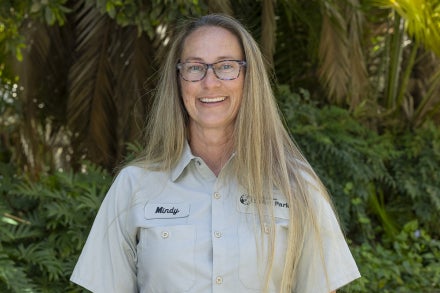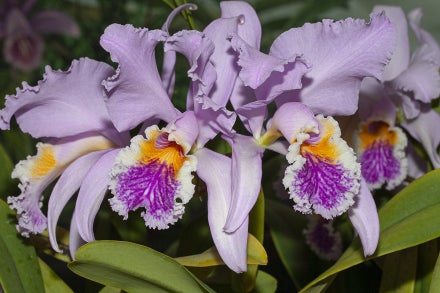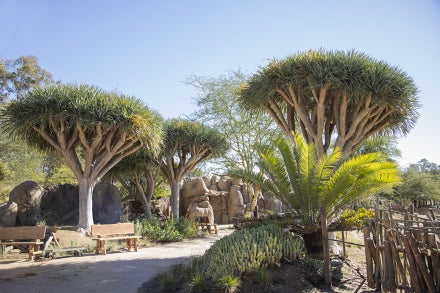
Seeing her in action, it looks like just another impossibly tiny neonate being patiently fed a bottle by a professional wildlife care expert at the San Diego Zoo (SDZ). But a closer look reveals this is no ordinary case that the Neonatal Assisted Care Unit (NACU), along with Cora Singleton, DVM, and the koala care team is keeping alive. “We have never raised a koala this young,” said Becky Kier, lead neonate care expert. Early on, the joey looked more like a featherless cockatoo than a miniature marsupial.

Koalas typically stay safely tucked inside their mom’s pouch for the first six months of life. But this joey’s mom, Beejay, passed away from lymphoma while her son was still developing in her pouch. After Beejay’s diagnosis, “She was placed on palliative care with the goal of allowing her joey to further develop,” explained Becky. But in the end, the joey was only 5.5 months old, weighing a mere 5.46 ounces (155 grams), and “about the size of a fat stick of butter.” After Beejay's passing, Becky made a heartfelt vow to her that they would do their best to raise her little one. And that they did!

Talk about an underdog—this joey was underweight and under the weather. They even called experts in Australia for tips on feeding joeys this small, since marsupial care runs deep in their blood. They provided some suggestions, but even the Aussies remained skeptical about the outcome for a youngster this little. Staff persisted, keeping a close eye on the joey and feeding him every few hours, around the clock. Becky explained that when they are with their mom, a joey can nurse any time they want, a little at a time, but in a zoo setting, they must eat on a more regimented schedule. The very first bottle the joey got, he slurped it down almost too fast (you never want them to aspirate or blow it out of their nose), so Becky went back to their “nipple arsenal” and used one with a smaller opening for the next feeding. She used the “three point contact hold” when feeding the joey—pinkie under its chin, thumb and index finger smooshing his lips to the bottle to help him latch on. Despite the small victories, they remained guarded.

In those first few weeks, they almost lost him twice, Becky said. The first time, he was listless and lethargic but—as though feeling all the tension and mojo directed at him—he rallied. A week later, Dr. Cora noticed open-mouthed breathing when she was conducting a routine check. “Fungal pneumonia is common in marsupials,” she said. So the little guy was whisked up to the Zoo hospital for breathing treatments. After two weeks of care there, he returned to the koala compound, where he stayed in a toasty, humid incubator containing a suspended faux pouch (made by volunteers) with a “pouch stuffy” inside to hold on to, and a plush koala to climb on outside the pouch. SDZ wildlife experts continued to care for him. By this time his was growing, but remained “bubble gum pink from the waist down,” said Becky. “He looked like he was wearing a hairy T-shirt.”

The joey has since graduated from the incubator to spending about eight hours each day in cozy enclosure with eucalyptus leaves to practice eating, and a plush koala to climb on. Happily, he now leaves the pouch to go potty—a milestone any parent can appreciate! Additionally, his hand-eye coordination is improving. “He’s grabbing leaves and teething on the stems,” said Becky.
He is still small for his age, though. As his mother was ill, her milk may have stunted his physical development. “His brain is ready for eucalyptus, but his teeth are not,” she added. “He’s about five weeks behind in physical development.” Now weighing about 1 pound (460 grams), Becky describes him as the size of a soda can…with tufted ears. This happy achievement is shared with SDZ wildlife care staff and Dr. Cora. But for Becky, it’s personal, as her now 19-year-old son was born 3 months early, weighing in at 2 pounds. That preemie training proved invaluable for her job at the Zoo. “Been there, done that” is her philosophy, and it seems to be effective.

Ten weeks after losing his mum, the joey has earned his name Omeo, an Aboriginal Australian word meaning “mountain.” He is getting about 20 minutes of sun exposure a day, and soon his caregivers will walk him around in a baby-carrying wrap secured to their body, to provide movement and introduce him to the world. It is hoped that one of the females in the Zoo koala colony will “adopt” him. “The goal is that he’ll have a family to hang with in the next couple of months,” said Becky. And that will bring joey joy to us all.
Karyl Carmignani is a staff writer for San Diego Zoo Global. Read her previous story, You Never Know Who You'll Meet!




